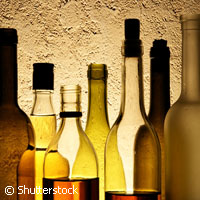Scientists develop techniques to trace cocaine hidden in alcohol
Researchers from Switzerland and the UK have developed two techniques aimed at thwarting drugs smugglers: cocaine dissolved into bottles of wine or rum can be identified quickly. These techniques will help customs officials uncover which bottles are being used to smuggle cocaine without the need to open or disturb the container. The new techniques were recently presented in the journal Drug Testing and Analysis (DTA). Imaginative techniques aimed at smuggling cocaine, one of the most widely used drugs of abuse, through border controls have been used in recent years, including dissolving cocaine in liquids. A UK man died last year after unknowingly drinking from a contaminated bottle of rum. However, it is currently impossible for customs to check alcohols for cocaine without opening and damaging the bottle, particularly for large or expensive alcohol shipments. The researchers said a non-invasive approach also has the advantage of not arousing the smuggler's suspicions, thus allowing investigators to track the recipient of the drugs. The UK team, led by scientists at the Universities of Bradford and Leeds, used Raman spectroscopy (RS), which employs laser light to identify molecules, to identify the cocaine in alcoholic substances. With a portable scanner, they tested cocaine dissolved in ethanol and several branded light and dark rums, in a variety of coloured glass containers including clear, brown, light green and dark green. They found that the cocaine was detectable in all liquids tested and through all of the glass colours. 'Until now it has been difficult to detect cocaine in liquid form in these environments,' said Dr Tasnim Munshi, a lecturer in inorganic chemistry at the University of Bradford. 'However our study shows that using an analytical technique such as Raman spectroscopy we can successfully detect the presence of these drugs without removing specimens from their containers.' She said that her team believed that 'a portable Raman instrument will prove vital in the fight against illegal drug smuggling by allowing for the fast and effective screening of different solutions over a very short space of time'. Meanwhile, researchers led by Dr Giulio Gambarota from the Swiss Federal Institute of Technology Lausanne, used magnetic resonance spectroscopy (MRS), the technique behind clinical MRI scanners, to test wine bottles contaminated by cocaine. A MRI scanner is not portable, but can test large cargos at once in a few minutes, including set up and evaluation of the results. The team found that it was possible to detect cocaine in wine in a scan time of one minute. 'By fostering collaboration between police or customs officials and a local medical department, this technique can be used to evaluate large numbers of bottles in a short time, giving information not only that there is another substance in the alcohol as with current scanning techniques, but exactly what that substance is, said,' Dr Gambarota, adding that 'this method could also be used in other sorts of smuggling where drugs are dissolved into liquids, so there are many further opportunities for use.' Despite this positive conclusion, the researchers acknowledged in their paper that the detection limit could be degraded by the presence of metal. They said this problem could arise if, for example, the suspect wine bottles were surrounded by a metallic net, had a metal cap or were stored in aluminium-coated containers They also pointed out that while such investigations can be performed in any hospital that has a MRI scanner, the experiment would have to be carried out by MRS-trained staff in order to ensure the data acquired was accurate.
Countries
Switzerland, United Kingdom



